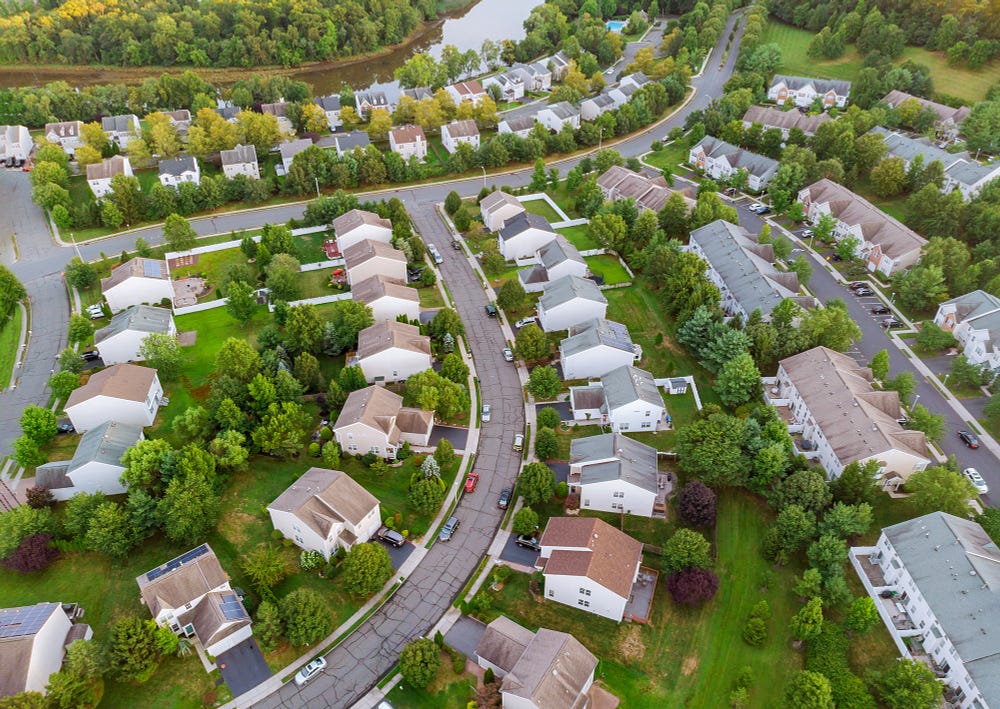Plus, three ways real estate still reigns supreme.
Before beginning, there are some important considerations to make. Much of this does not apply to:
—a person’s primary residence, regardless of whether they own it or are renting the place
— someone who is temporarily renting out a home/apartment intending to eventually live in it permanently
— people who own accommodation overseas that they generally live in when returning to that country, assuming they frequently visit it for work or leisure.
Rather, this is mostly directed at people with several investment properties in one city/region and their wealth is heavily concentrated in this asset class.
Later in this piece, I will also touch on two main reasons why people still prefer to invest in housing and land rather than assigning those funds to BTC.
Let’s jump into it.
1) It is simpler to split and liquidate digital assets (for now)
Beginning with the most obvious one, there’s often a lengthy process and a vast amount to be spent when transferring property ownership.
However, once we see mainstream adoption of fractionalised real-world assets — the idea of splitting ownership of a particular good into multiple fragments that allows you to own that specified portion directly rather than purchasing the entire item — through the use of blockchain tech, it will become far easier to liquidate tangible assets such as housing, artwork, classic cars, collectibles, etc.
In the meantime, Bitcoin and other digital assets remain the easiest way to convert your holdings into fiat whenever you need instant access to cash. Moreover, this nascent asset class remains the most effective way to send worldwide in minutes, sometimes seconds, without relying on an intermediary.
This also ties into the following point for those beginning their Bitcoin/crypto journey.
2) A significantly lower barrier-of-entry
Yes, you can still invest in real estate even if you don’t have enough to buy an entire property — through using real-estate investment trusts (REITs), crowdfunding measures and buying shares primarily involved in this sector.
However, unlike non-custodial options for digital assets, you don’t fully control the asset you’re investing in.
At least for Bitcoin (and soon to be the case for Ethereum), you can follow a similar strategy via a spot exchange-traded fund. Alternatively, you can custody your assets or use regulated and reputable crypto exchanges.
3) Earn interest on your BTC, ETH and altcoin (not just your real estate investments)
For those unfamiliar with the idea of staking, there are various crypto assets (ETH, ADA, BNB, LINK, DOT, etc.) where you can lock up (stake) your coins/tokens to help secure the network by validating transactions. These are broadly referred to as proof-of-stake (PoS) cryptos.
In return, you earn staking rewards akin to interest in a bank account.
Bitcoin as well? You can earn interest in a non-staking asset such as BTC through lending platforms (often available via centralised exchanges) or even indirect “staking” via Stacks or other Bitcoin layer-2 platforms such as Social Network.
It is also possible to lend BTC by “wrapping” it, i.e., converting BTC pegged 1:1 with an Ethereum token called Wrapped Bitcoin (WBTC), which allows it to be readily used on decentralised finance (DeFi) protocols.
Many exchanges allow their clients to lend crypto (including PoS) assets to earn modest interest, often compounded at frequent intervals (daily through to quarterly).
By now, you should have a decent understanding of how versatile digital assets are.
So, when comparing annual ROIs on real estate versus BTC/crypto, factor in the interest earned on the principal well. These modest amounts can add to significant sums, particularly if said digital asset does a 30–50x in less than five years, which is plausible for many altcoins.
Even BTC and ETH doing 10x within a few years puts real estate to shame, even when accounting for tax concessions for property investors (more on these shortly).
4) It is harder to seize Bitcoin than real estate
Housing is a secure investment, particularly in many developed countries…until a government intervenes.
There’s the unfortunate situation of having your house or land in an area of planned infrastructure, such as a highway or airport. In that case, the government will purchase it from you, and you might be adequately compensated for it, but you might not be.
The Yanks call it eminent domain; Down Under, we call it compulsory acquisition.
At a more sinister level, if you are ever considered unfavourable by the state or are involved in “shady” operations (whether you are or are deemed “an enemy” by the state), then the government can easily take control of your property.
There’s an incident in the UK where a local elderly couple reportedly received a letter from their local government about the British equivalent of this (called a Compulsory Purchase Order) to reportedly* house migrants.
Yes, even Bitcoin and crypto can be seized — as the US Government has done in multiple cases and has billions of dollars in BTC — but it is not as straightforward as physical assets. Unlike property — let alone almost every other investment — you can easily travel anywhere with your digital wealth without relying on a centralised service.
It’s far easier and quicker to move borders with millions of dollars in Bitcoin than go through selling your house and cashing out before statutory departments get involved.
With strict KYC AML laws in 2024 and many people treating centralised exchanges as digital banks, governments can also force these custody platforms to freeze customer accounts, as these entities essentially function as de-facto crypto banks.
This is about those who have private keys for their BTC, ETH or altcoins on a non-custodial wallet, especially ones that have received these coins/tokens without going via an exchange.
So far, I’ve only covered the developed world. What about developing countries?
In some places, you don’t even own the land you live in; case in point, China. The government always owns the land and leases it to those permanently residing on that block (most likely apartment “owners”) for 70 years.
Check out the International Property Rights Index 2023 and the corresponding world map to gauge your country rates compared to others. You’ll be surprised how restricted many residents and citizens are regarding this topic.
*According to Ground News, the two sources that have covered this story are right-leaning and have mixed factuality with their reporting. There’s an additional one, including a video excerpt of the elderly couple being interviewed about this.
5) Not dealing with difficult tenants
While many good, respectful tenants, many inconsiderate ones leave much to be desired, which should be avoided at all costs, not just as tenants but as individuals.
The equivalent for digital assets would be borrowers, as mentioned in point 2. Fortunately, through lending platforms (either third-party ones or decentralised options), you have a system setup that requires borrowers to use their crypto as collateral if they fail to repay the loans.
For real estate, you have rental bonds that can cover minor losses through legal avenues (i.e., potentially suing a client) if they damage your property. However, this can be time-consuming and mentally draining when seeking compensation.
Like many successful property investors who earn rental income and boost their net worth through appreciating real estate, crypto lending platforms allow you to earn income on assets and further accelerate the profits you generate from this space.
Yes, it’s common to have an agent working on your behalf to sort out rent collection, repairs, communication, etc. Still, there’s something more appealing about the seamless nature of decentralised lending/borrowing protocols that function by automatically deploying smart contracts.
Whilst decentralised platforms such as Aave and Yearn Finance are still in their infancy, they will continue to grow in popularity alongside their centralised counterparts such as Binance, Crypto.com, Nexo and Arch, to name a few.
5) Not having to commit to a gargantuan mortgage
My country, Australia (specifically Sydney and Melbourne and their outskirts), is notorious for becoming unaffordable in 2024, with supply outstripping demand. I’ll refrain from elaborating on the reasons, as this is already long.
Look at a housing website showing property prices in Sydney if you wanna laugh, cry, scoff at or rant about this. If you want a house in a “nice” area (highly subjective, I know) in Sydney, you’ll be looking at over US$1.3 million.
It has the second-worst housing affordability in the world after Hong Kong, with a house price to annual income ratio of 13.3. It’s reassuring to know that it’s not as bad in many other major cities, but ridiculous nonetheless.
This is a complex, multi-layered issue, with politicians liable for our predicament.
To play devil’s advocate, I know what people will say: If I choose not to invest in this, someone else will…and they’re right.
Where do digital assets fit into this discourse? BTC and altcoins can be used to boost your ROI to use significant windfalls from this space to fast-track purchasing your own (dream) property, whether it’s your first home or an additional one.
Having secure accommodation is essential to living a dignified life.

at
6) Fewer issues with the elements affecting your Bitcoin vs your house or land
Whilst Bitcoin has its own set of issues to worry about — mining centralisation and excessive government regulations (particularly draconian ones that render Bitcoin and crypto trading/ownership illegal) — its distributed setup means that no single disaster (whether natural or artificial) in a particular region will knock out the Bitcoin network, let alone other reputable decentralised systems.
Yes, there’ll be temporary dips in hash rate (computing power) for Bitcoin, but this will be short-lived as other miners come online to take advantage of the relatively lower.
One argument that Bitcoin sceptics can make is that the hash rate is still heavily concentrated in a few places: the USA, China and Kazakhstan (in descending order of mining dominance), which collectively account for roughly 70%^ of the total hashing power.
To counter this, China historically controlled over half of the miners until 2021, when its central government temporarily banned BTC mining (and still imposes strict limitations), allowing the US to reach and maintain the top spot.
^As of January 2022, according to the Bitcoin Mining Map, derived from the Cambridge Bitcoin Electricity Consumption Index.
Reasons why real estate remains more attractive than Bitcoin/crypto
Here are a few reasons people will still choose property investing over a more speculative alternative.
Less risk and a strong track record
The expectation of house and land prices continuously increasing has made property investing into the booming industry that it is today, particularly in popular markets worldwide.
Yes, there are many places where property prices fall or stagnate. However, individuals can make informed decisions about which locations to focus on with the plethora of information about this industry and macroeconomic factors influencing this — inflation, interest rates, employment, migration, etc.
A superior lifestyle, ample job and education opportunities, a growing population with limited land, and globalisation have all contributed to demand consistently outpacing supply, thus leading to strong property price gains.
Tax concessions
If it weren’t for generous negative gearing systems available — coupled with lengthy periods of low-interest rates up until two years ago — I doubt property investing would be as popular as it is now, at least not so quickly.
In a nutshell, negative gearing refers to deductions for property owners when the costs of owning an investment are greater than the benefits (e.g., rental income). It is especially attractive to high-income earners who usually fall into a high tax bracket.
Yes, other factors are at play here, notably a lack of money-laundering checks and balances for real estate in my own country that have made Australia an attractive destination to park money into legitimate assets like housing; a special thanks to the Australian politicians on both sides for permitting this.
However, the thought of making changes to negative gearing is considered political suicide, especially in Australia, and becoming more untouchable by the day as real estate continues to defy the odds in an overheated market.
Preference for physical goods rather than digital value
I don’t blame them. Some individuals are in a position in their lives, e.g., couples, families and older people, whereby they are unable (or rather, it would be deemed reckless) to assign a significant portion of their net worth to Bitcoin.
However, it is also foolish not to have any exposure to BTC and a handful of blue-chip altcoins.
As the pioneering cryptocurrency solidifies its reputation, companies such as BlackRock, Fidelity and Ark Invest) are doubling down on it.
One of the most bullish statements comes from BlackRock CEO Larry Fink:
“It (Bitcoin) is no different than what gold represented for thousands of years. It is an asset class that protects you.”
This is the excerpt from a related interview with CNBC last month.
JUST IN: BlackRock CEO says #Bitcoin is "no different than what gold represented for thousands of years. It is an asset class that protects you." pic.twitter.com/8bdQMQOnHi
— Bitcoin Magazine (@BitcoinMagazine) January 12, 2024
Adding to the optimism are comments from Ark Invest CEO and CIO Cathy Wood in another interview with CNBC:
“Our base case (for Bitcoin) is the $600,000 range. Our bull case — we think the probability of the bull case has increased with the SEC approval — is $1.5 million by 2030.”
Nonetheless, many investors (particularly older ones) cannot fathom putting their money into something they cannot touch. There’s always a probability that these people are wrong, and a major black-swan event comes along and completely voids such forecasts.
As always, each to their own.
We should focus on investing in what we understand and what corresponds to our individual
This LinkedIn piece outlines five reasons real estate is considered superior to other investment forms.
Final thoughts
Real estate will most likely remain the most popular way for people to build their portfolio and fast-track their way to an earlier retirement.
Besides the reliable financial incentives to do so, I acknowledge there are certain cultures whereby home ownership is essential, and some have developed a reputation for snapping up as much property as possible, though I digress.
You’re less likely to get older (let alone a large chunk of middle-aged) people to gain exposure to digital assets. However, this is slowly changing since the recent advent of multiple Spot Bitcoin ETFs.
Ultimately, you should prioritise reliable investments that you understand, and if that’s real estate, so be it.
Each asset has environmental impacts, but I have left this out for brevity and relevance, particularly as this piece is focused on investing preferences.
In a nutshell, both real estate and Bitcoin (let alone other Proof-of-Work blockchains) require vast amounts of resources to build the infrastructure of each respective investment class: Building materials for constructing residential and commercial properties and the process of extracting elements and compounds that go into manufacturing ASIC miners.
I have previously covered the various impacts (both positive and negative) that Bitcoin has on energy grids and have produced pieces about e-waste associated with discarded ASIC miners, available FYRP.
This also ties in with the discussion of how moving Bitcoin’s blockchain from PoW to PoS is (increasingly) unrealistic, which I have covered in these articles.
Whilst about 99.5% of digital assets are a scam or overrated at best, it’s naïve to disregard the best-performing asset class over the past years. BTC’s track record goes back to 2009, and the coin is close to hitting its all-time high.
Moreover, Ethereum’s blockchain and corresponding coin are most likely here to stay, amongst a selection of other altcoins with long-term potential.
Keep a close eye on this space in the coming months and years, and best of luck with your investments.
Lorenzo
Further reading
Ways to support my work
• Check out this post for various affiliate links and promotions you can use to top up (or kick start) your crypto portfolio. By using these, I earn a small commission at no extra cost to you.
• All of my articles (including previous ones) are now published for anyone to read on Medium, including non-members. I welcome any crypto donations if you’d like to support my work. Please use the following addresses to do so.
BTC — bc1qny59y95g4narcf4a7d3k9g7h54kc8jakj9t87a
ETH — 0xF4D51542Ed8bb769F87692e220Ea31932f184887
ADA —
addr1q9dkkzs8sfevxve72ttmtgthsdcddut86ssttlhn25t9qczmdv9q0qnjcvenu5khkksh0qms6mck04pqkhl0x4gk2psq5c5gqz
XRP — rLDThKVeMCZQCZcT4uzBU6NTSPHxwmRifE
DOT — 15Gn8DZeZY3pmLczjwx7WGUc7TXXme8y2nrxuC6o4hBxn7jX
Disclaimers
• N.B. None of this is financial advice; I am not a financial advisor. You are ultimately responsible for crypto investments, let alone in any asset class.
• The opinions expressed within this piece are my own and might not reflect those behind any news outlet, person, organisation, or otherwise listed here.
• Please do your own research before investing in any crypto assets, staking, NFTs or other products affiliated with this space.
• Information is correct at the time of writing.
Originally published at https://www.cryptowithlorenzo.com

